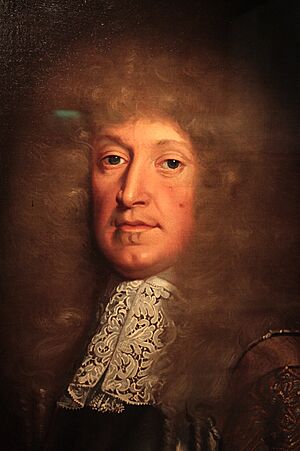Sir John Robinson, 1st Baronet, of London facts for kids

Sir John Robinson, 1st Baronet, of London (born January 10, 1615 – died February 1680) was an important English businessman and politician. He was a member of the English Parliament from 1660 to 1667. He also served as the Lord Mayor of London in 1662.
Contents
Sir John's Family Background
John Robinson was the son of Archdeacon William Robinson. His father was the half-brother of Archbishop William Laud. John was also the nephew of Sir William Webbe, who was Lord Mayor of London in 1591.
Sir John's Career in London
Sir John Robinson was a successful merchant in the City of London. He was part of the Worshipful Company of Clothworkers, a group of people involved in making and selling cloth.
Early City Roles
From 1651 to 1653, and again from 1655 to 1656, he was a court assistant with the Levant Company, a trading group. On December 18, 1655, he was chosen as an alderman for the Dowgate area of London. An alderman is a senior member of the city council. In 1656, he became the Master of the Clothworkers Company. He then served as Sheriff of London from 1657 to 1658. The Sheriff was an important official in charge of law and order. In 1658, he became an alderman for the Cripplegate area. He also became a Colonel of the Green Regiment, a military group, in 1659 and held this role until 1680.
Becoming a Member of Parliament
In 1660, Robinson was elected as a Member of Parliament (MP) for the City of London. This meant he represented London in the Parliament. He was knighted on May 26, 1660, which means he was given the title "Sir." Soon after, on June 22, 1660, he was made a baronet, another special title. He also became the Lieutenant of the Tower of London from 1660 to 1680. This was a very important job, overseeing the famous Tower of London. In 1660, he also became the vice-president of the Honourable Artillery Company, a military society.
Lord Mayor and Trading Companies
In 1661, Robinson was elected as an MP again, this time for Rye. He became the president of the Honourable Artillery Company in 1661 and stayed in that role until 1680. In 1662, he achieved a very high position: he was elected Lord Mayor of London. This made him the main leader of the City of London. In 1663, he became an alderman for the Tower area. He was also on the committee of the East India Company, a major trading company, for several years between 1666 and 1677. In 1670, he became the deputy-governor of the Hudson's Bay Company, another big trading company.
What People Thought of Sir John
Not everyone agreed on Sir John Robinson's character. Samuel Pepys, a famous diarist of the time, wrote that Robinson was "a talking bragging bufflehead" and "as very a coxcomb as I would have thought had been in the City." This means Pepys thought he was boastful and a bit foolish.
However, another report about the aldermen in 1672 said something different. It stated that Sir John "had been most industrious in the civill government of the cittie." It also said he was "watchfull to prevent anything that might reflect any prejudice or dishonour upon the King's government" and was good at getting things done, which made people happy.
Who Came After Sir John
Sir John Robinson was followed by his son, Sir John Robinson, 2nd Baronet, who inherited his title.
 | Charles R. Drew |
 | Benjamin Banneker |
 | Jane C. Wright |
 | Roger Arliner Young |

